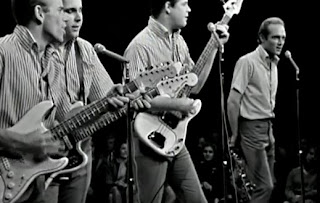Everybody's
learning how
Come
on and safari with me.”—“Surfin’ Safari,” written by Brian Wilson and Mike
Love, performed by the Beach Boys, from their Surfin’ Safari LP (1962)
Though
released as a single two months before, “Surfin’ Safari” by the Beach Boys entered the Billboard charts on this date in 1962,
eventually peaking at #14. It would become the centerpiece of the group’s first
album, released two months later.
“Surfin’
Safari” (labeled “Surf and Safari” at the time) was one of the songs featured
on the demo tape that Murry Wilson, father of the three sons that comprised the heart of the group, used
to promote the young musicians to Nik Venet of Capital Records, who signed them
almost immediately after hearing the demo in April 1962.
It
was a fun (or, as the musicians would later put it, “fun, fun, fun”) record,
brimming with influences such as the Four Freshmen and Chuck Berry. It’s also,
indisputably, a song born of a time, place and mood unique in American life.
It’s
hard to believe for a state with such a rocky economy these past several years,
but Southern California in the early 1960s symbolized good times, in every
sense. The defense and aerospace industries in the state were riding the wave
of a postwar boom. Somehow, it seemed appropriate that, for the children of the
white-collar workers at the heart of this boom, “catching a wave” came to have
literal force, as a whole youth culture flocked around the state’s beaches.
Brian
Wilson might have been the group’s principal songwriter and troubled genius
(though not yet cracking under the effects of his abusive father), but it was
younger brother Dennis Wilson who
was the group’s only actual surfer. It was he who tipped off Brian and cousin
Mike Love about the growing surf trend: “You guys ought to write a song about
it,” he urged.
A
month and a half ago, New York Times
columnist David Brooks marveled over “The Power of the Particular”: “If your identity is formed by hard boundaries,
if you come from a specific place, if you embody a distinct musical tradition,
if your concerns are expressed through a specific paracosm, you are going to
have more depth and definition than you are if you grew up in the far-flung
networks of pluralism and eclecticism, surfing from one spot to the next,
sampling one style then the next, your identity formed by soft boundaries, or
none at all.”
The
inspiration of this epiphany was the columnist’s astonishment over how Europeans
could embrace so readily Bruce Springsteen, whose songs (particularly the early
ones) are spiked with references to his home turf of the Jersey Shore. But the
same applies just as much (perhaps even more so) to the Beach Boys.
Consider
this: In “Surfin’ Safari,” the group summoned such California places as Huntington,
Malibu, Rincon, and Laguna. In another early
group tribute to surfing, “Surfin’ USA,” the place-dropping was even more
vigorous, with 11 different beaches in the state mentioned. It was all more
than just a rock ‘n’ roll adaptation of the kind of “list song” that Cole
Porter had made famous. No, this evoked an entire world—one that people all
over, at that time, couldn’t wait to join.
A
little over a decade later, the California Dream had already started to curdle,
perhaps evoked nowhere more savagely and poignantly in The Eagles’ Hotel California song, “The Last Resort”:
“They called it paradise/The place to be/They watched the hazy sun, sinking in
the sea.”
The
early 1960s were the Beach Boys’ sun-kissed moment—before Brian’s breakdown,
before the band’s late ‘60s slide into an oldies group, before the death of the one
true "beach" boy, Dennis in 1983. In 1962, with “Surfin’ Safari” and other tunes that
Brian began to crank out (and soon tire of as formulaic), they were about to become
America’s Boys of Endless Summer. None of the boys had any idea of the stress and storms
waiting for themselves, their state, and their country in the next decade—and
half-century.
(The photograph shows the Beach Boys at their
so-called “Lost Concert,” 1964, a performance believed lost for 35 years.)

No comments:
Post a Comment